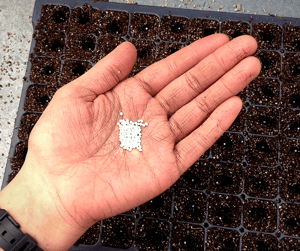.png?width=600&name=Selecting%20Your%20Seeds,%20Blog%20May%202019%20(2).png)
KNOW YOUR SEED
Seeds such as lettuce can be pelleted with a clay outer coating that makes it easier to see/handle and are all uniform in size/shape and are available organic and conventional.
Make sure to keep soil in trays or beds extra moist for proper germination for pelleted seeds. We recommend using these seeds within a year of purchase because the coating diminishes the germination rates after one year.

- Do you need a vigorous, highly uniform and productive variety? F1, or hybrid, varieties are bred for productivity, uniformity of shape, size, and color and plant habit for ease of harvest.
- Open-pollinated (OP) seeds have unique flavors and colors. All lettuce, beans and peas are OP. These are great for market gardeners as well as wholesalers that are interested in the uniqueness of each variety and for those that want to try saving their own seed.
- Do you want organic, untreated or treated seeds? Organic seeds are grown and produced under organic systems without the use of pesticides or other synthetic elements. Untreated seeds are grown under conventional systems, but have no further synthetic elements on the actual seed. Treated seeds are grown under conventional systems and have a synthetic coating that are brightly colored (red, green, and blue are common). When handling treated seeds, it is suggested to use gloves and a mask. For organic growers, treated seeds are prohibited. If a variety is not available organically, organic farmers can use untreated seed. It needs to be documented in three places that a specific variety is not being produced organically or is unavailable organically at a certain time.
KNOW YOUR CLIMATE
.png?width=300&name=Seed%20Selection%20Blog%20Image%20(1).png) Different seeds are bred for different growing conditions. There is a trend to move toward more adaptable varieties to be versatile for diverse climate conditions.
Different seeds are bred for different growing conditions. There is a trend to move toward more adaptable varieties to be versatile for diverse climate conditions.- Certain crops are slotted for different seasons, so pay attention to what season a variety is slotted for. For example, there are leeks that are slotted for summer-fall growing that are generally greener in color, whereas fall-winter slotted types are blue-green and can overwinter in some places. Each slotted variety will have different characteristics, growing needs and days to maturity.
- Look at the disease resistances of each variety. There are more seeds available now that have Downy Mildew and fusarium resistances, among many others. Our Osborne Quality Seeds catalog has disease abbreviations next to each variety name and a full chart of disease resistances in the back of the catalog.
KNOW YOUR MARKET
.jpg?width=300&name=Osborne,%20Mixed%20box,%20Cornucopia,%20eggpland,%20tomato,%20spinach,%20cucumber,%20tomatillo,%20cabbage%20(9).jpg)
- Growing for wholesale vs. direct market sales can dictate what varieties will work best. If you need reliable, staple crops, look for the market standard varieties that are tried and true. If you are trying to differentiate yourself in a farmer’s market setting, look for specialty varieties or diverse color options to fill out your selection.
- Many varieties are bred for specific sizes that work well for packing into standard cases on the one hand or work well in a mixed CSA box on the other hand. So paying attention to size and uniformity can help fit your market needs.
We offer a wide range of high quality seeds that are geared towards as many needs as possible. We carry a selection of hybrid and open–pollinated seeds, as well as organic, untreated and some treated seeds. Our seeds are sold by the seed count or weight. For seed count, 1m translates to 1,000 seeds. We prioritize offering market standards alongside unique and cutting edge varieties that will catch anyone’s eyes. We are here to help you to select the best seeds for your farm’s needs to grow high quality produce for you and your customers.